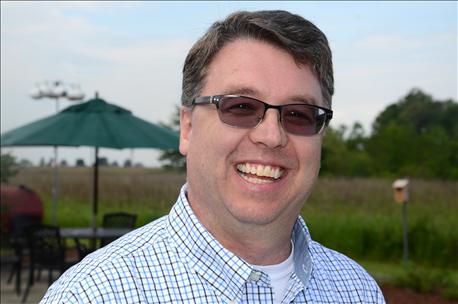
I knew Brad Pfaff wasn’t your typical stiff-shirt bureaucrat as soon as he started talking at the 30th anniversary celebration of the Conservation Reserve Program. He accompanied Indiana state FSA director Julia Wickard to Ripley County to Bob and Ellen Mulford’s conservation showplace. Pfaff is farm programs administrator for the Farm Service Agency at the federal level.
“I grew up in southwest Wisconsin, about an hour and a half from Madison and an hour and a half from Minnesota,” he says. “We had a small dairy farm, milking about 40 cows and farming about 250 acres.”

FARM BOY AT HEART: Brad Pfaff may be an FSA federal administrator, but he loves to talk about FFA and basketball.
Wait a minute! I grew up on a small dairy farm 30 miles from Indianapolis. We milked about 40 cows and farmed about 250 acres.
The only difference was his family owned part of the land, while mine didn’t. So the land where we farmed is all in houses. His small farm is Wisconsin is still there.
When lunchtime came around, he settled in across the table from me and my good friend Duane Drockelman. Retired from the Natural Resources Conservation Service, Duane also grew up on a small farm, no cows that I know of — this time in Ripley County, where he now lives. He and I are fellow Boilermakers.
Duane shared his experiences about once being the district conservationist in Johnson County, where I live, and how he was there the day former Sen. Richard Lugar christened the Conservation Reserve Program on his farm.
“I helped get Tom interested in conservation,” he told Pfaff. “He was teaching agriculture way back then, and I convinced him to become an associate supervisor for our soil and water conservation district.”
Pfaff’s eyes lit up. “You taught ag?” he asked, looking my direction.
“Yes, for a short time. I still coach FFA teams when I can. We’re having trouble in this state finding enough ag teachers to go around,” I added.
“Wow! That’s happening in Wisconsin, too,” he added. “There are several schools in my area that are thinking about closing down their agriculture programs because they can’t find ag teachers.”
“That may happen here too,” I noted. “There are more than 20 schools looking for teachers for next fall, and there are virtually no applicants out there.”
“That’s a shame,” he added. “Ag classes and FFA are important.”
Somehow the conversation turned to basketball. It didn’t take long to figure out he was an avid fan, bleeding Badger red. “We really had some hard times back in the day, but we’ve come a long way,” he noted, rattling off coaches going back 40 years.
“Yes, we liked that Steve Yoder,” I laughed. “Purdue could beat him anytime they wanted.”
“Yes, we certainly turned it around when Dick Bennet came. Bo Ryan was a tremendous coach.”
No argument there.
“Hey, what happened to Purdue? I thought you guys would have an awesome team this year!”
Duane and I looked at each other. “We’ve been asking the same question,” I said.
“That year you guys had Robbie Hummel — that would have been a Final Four team if he hadn’t got hurt,” Pfaff said. Man, this guy knows basketball!
“John Wooden is my favorite coach of all time,” he continued, smiling. “I love to read about what he did, and how he did it. He was from Indiana, too.”
A Boilermaker no less, but I didn’t say it.
“Yes, he grew up just 20 miles from us, in Martinsville,” I noted.
“Really!” Pfaff said, getting excited.
“Yes, they have a statue of him in the foyer of their gym, and lots of information about him,” I said.
That did it. Without saying a word, he pulled out his card and handed it to me.
“Someday we will have to get together,” he said.
Now that’s an administrator that talks a common language!
About the Author(s)
You May Also Like




